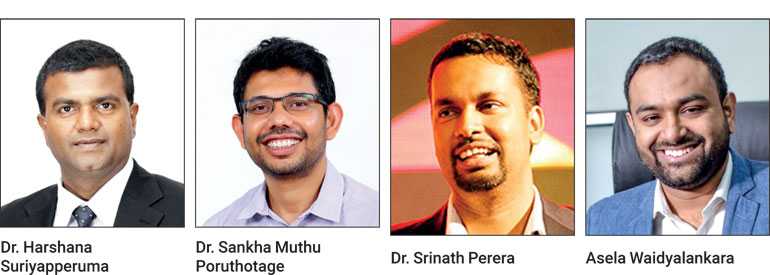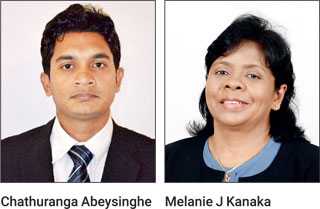Monday Feb 16, 2026
Monday Feb 16, 2026
Thursday, 20 August 2020 02:19 - - {{hitsCtrl.values.hits}}

 Digital technology is changing the way businesses operate across the world, creating the need for a more agile, strategically capable workforce. Yet underinvestment in people and skills means many professionals are ill-equipped to face a digital future.
Digital technology is changing the way businesses operate across the world, creating the need for a more agile, strategically capable workforce. Yet underinvestment in people and skills means many professionals are ill-equipped to face a digital future.
CIMA Sri Lanka recently conducted a webinar titled ‘ABCDE - Artificial Intelligence, Blockchain, Cyber Security, Data Analytics, Ethics’ to highlight the importance and the changes brought about by the subject topics to the business world. The webinar was conducted over the span of three days, commencing with Artificial Intelligence and Blockchain on 15 July, Cybersecurity and Data Analytics on 16 July and Ethics on 17 July.
The eminent panel of speakers included Dr. Sankha Muthu Poruthotage, Founder/CEO, Linear Squared Ltd. (Artificial Intelligence), Dr. Srinath Perera, Vice President, Research, WSO2 Inc. (Blockchain), Asela Waidyalankara, Information Security and Cyber Consultant and Country Director – Sri Lanka, Comsec (Cybersecurity), Chathuranga Abeysinghe, ACMA CGMA, Lead Data Evangelist, MAS Holdings (Data Analytics), and Melanie J. Kanaka, FCMA CGMA, Head, Finance and Administration at World Bank (Sri Lanka and Maldives); CIMA Vice President, CIMA Appointments Committee Member, Association of International Certified Professional Accountants Board Member and the immediate past chair of CIMA Professional Standards Committee, Fullbright Scholar and certified SAP consultant and Dr. Harshana Suriyapperuma, FCMA CGMA, Director Corporate Affairs, Securities & Exchange Commission of Sri Lanka (Ethics).
Sankha focused on identifying AI (Artificial Intelligence), providing a sense of what it really is because it’s become such a buzzword recently, and spoke about real world applications of AI. Dr. Srinath spoke about what Blockchain is, and how it is built and reasons why blockchain would be used.
Regarding where Sri Lanka stands in terms of AI and blockchain, Sankha said: “Sri Lanka is behind the curve, as usual, on this as well. Unfortunately, we’re not as advanced as we think we are. The technology adoption is slow, and people blame it on the technology. However, there’s a lot of organisational restrictions and reluctance, people related reluctance. Lots of people, when they think of AI, they wonder if they’ll lose their jobs and be made redundant due to some AI process taking over what they’re doing.”
He continued to say that there’s a lack of trust in technology as we are not a tech savvy nation and people need to start looking at technology with an open mind for us to really reap the rewards of these technologies. Srinath on the other hand, said there were some positive cases, and that there were some organisations that use these technologies to some extent. He mentioned that these technologies do exist here, however it will take time to be widely available.
Asela explained what cybersecurity is and how it dictates lives. That it has become more prominent but suddenly when we are talking of enhanced digitisation, “we’re talking about moving completely certain functions of the organisation to work from home setting or remote working setting, then your cyber security and your threat matrixes tend to change and how you treat them as a threat tends to change.” He discussed real life case studies of cybercrimes in Sri Lanka whilst advising participants to take care of their cyber/digital hygiene.
Chathuranga briefed the audience on what data analytics means and how an organisation should look at it. He said that any profession needs to move into analytics whether you are a lawyer, an engineer, an accountant or a manufacturer, as data analytics will help the profession. Being able to know how to gather and structure data will save 30% of the time and being able to use tools like Power BI, Excel or Tableau will do wonders and give the ability to make informed decisions.
His advice to organisations and SMEs, was that all the information was available to learn about the consumer. If an organisation wanted to improve productivity, that is, improving internal efficiency and solve problems to eliminate waste, that too was possible. He urged companies to digitise their processes, and slowly but surely with this digitisation process for organisations, they will start generating the right information.
Asela advised the audience to “assume breach”, that whilst you cannot make it go away, you can make the organisation less of a target than anyone else. But the one mantra that he tells organisations specifically is to assume breach, behave and set your people, your processes in a way that a breach is assumed. A lot of non-IT professionals need to have awareness and understanding of cybersecurity, and where they are, because their work involves a lot of digital working in cyberspace. He continued to say, “although we treat our information and data in a very short-sighted manner, your information and data is valuable. And there’s $ value on it and people are out there waiting to grab and extract that data and send it.”
He said, our generation and the generation that’s coming up are going to be “born digital” so our lives will be wrapped around the digital space more and therefore, more features, hacks and exposure of data will be happening. He advised the participants to be vigilant, to ensure and exercise caution, for organisations to keep their people and processes in tune with their tech, because tech can give some sort of support for it, but it’s the people and the processes, who are not even involved in tech that need to compliment and augment that. He concluded it on the note that this discussion needs to shift from an IT department to the wider general public.
Melanie explained the CIMA Code of Ethics – its importance and how it can be practically applied. Harshana, took the audience through practical case studies and the issues that are faced on a day-to-day basis, and the challenges and possible solutions to overcome these issues. Both speakers emphasised on the importance of ethics and it being the foundation of all, however, in reality, ethics is viewed as the last component in the equation.
When asked what the guidelines are to get digital ethics right, Harshana said that the SEC, being the regulator of capital markets has a set of mandatory requirements, that would go through approval cycles at appropriate times which requires all listed companies to be compliant.
In today’s world, many have their personal interests in mind than the organisations or the professions, continued Melanie stating there was no environment devoid of self-interest and just because everyone is doing it for their self-interest doesn’t mean an individual has to go along with it too. Her advice was, “if you can’t circumvent it, then you need to disassociate yourself from it.”
In his concluding remarks, Harshana said: “As employees of organisations, as individuals’ part of society, you have the responsibility to work with each other and not put anyone in compromising situations, to ensure that the behavior and conduct is in line with the standards of the regulators and standards set by professional institutions.”